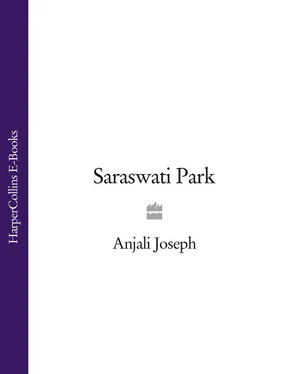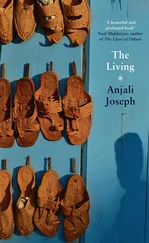‘I don’t clang,’ he said.
His sleeves were neatly rolled; he felt satisfied, clean and ready for the day; his mind moved ahead to the train, where he might get a seat, feel the breeze on his face, and be able to read.
The tea began to bubble; with a faint expression of distaste Lakshmi removed it from the fire and strained it into the same mug. She drew her housecoat about her and went into the living room.
When the train pulled into VT the station was alive but not yet swarming. Mohan walked away from the grand building and its light, high-vaulted hall. At the bus stand he moved through the queues and made for the GPO. How strange it had been, years earlier, when the letter writers had been forced to shift from its shaded colonnade, first to the pavement outside, and then under the tarpaulin at the kabutar khana. He had missed the shapes of people passing through the stone arches all day and the light as it changed – by afternoon, the figures in the colonnade became shadows with bright outlines. But he’d grown attached in turn to the sound of the pigeons when they took off and landed; their little kurr! kurr! of protest and, he sometimes thought, happiness.
He wasn’t the first to arrive. When he returned from the stationery shop with his possessions, Khan, the oldest of the remaining letter writers, had already unlocked the tables and sat drinking the first cup of tea, the Urdu Times spread in front of him. He was an irascible, balding man with tiny spectacles; although dark-skinned, he often seemed to redden in the sun. Mohan sat down, stowed his tiffin under his table, and arranged his pen tray; he put the torn red postal ledger into the drawer in the table and laid out the stack of electronic money order forms and a small pot of gum. He opened his book. Soon, to the sound of kurr! kurr! above him, he was deep in an elliptical, drawn-out conversation between Lambert Strether and Maria, a woman Strether had just met. The flow of commuters outside the tent increased.
‘Uncle.’
He recognized the woman, who was in her early thirties. Today she wore a bright green sari. She beamed at him; he smiled, and took up a money order form. Two thin gold bangles on her arms chinked among the glass ones.
‘Uncle, two thousand five hundred rupees.’
He uncapped a pen. ‘Name of the addressee?’
‘Ganesh Solanki.’
‘Name of the village?’
‘Bhandari.’
‘Chhota post?’ She named a town that no one in the city would have heard of. ‘Bada post?’ A slightly larger town.
Mohan opened the directory to check the postal code. While he flipped through the torn, closely printed pages, she wrapped the free end of her sari around her right shoulder, and swayed on one foot, looking into the crowd. It was hot now, full mid-morning sun. The flowery, synthetic scent of her talcum, mingled with perspiration, drifted to Mohan, and he looked up for a second before lowering his eyes again. Got it: 811 307. She would be a different person at work, he thought, copying the code into the form: heavily made up, standing in a doorway and calling out to the men who passed, but this morning, up early and neatly dressed, she was a figure of efficiency, a working woman.
He gave her back the form, which she would have to take to a counter inside. She smiled and took out a roll of notes from her blouse; she held out a twenty-rupee note. He nodded, but her bright green sari was already bustling its way into the sun. As it receded the flash of viridian made him think of the parrots that used to come in a sudden swoop at dusk and roost in trees near the old house at Dadar.
For a while he sat and watched the world, framed at the upper edge by the fringe of the tarpaulin – hairy bits of rope and a jagged piece of packing plastic, once transparent, now grey, hung down. Beyond this, all around the letter writers, life persisted at its noisiest. A fleet of cockroach-like taxis in black and yellow livery waited at the junction outside the GPO. When the lights changed they all, honking, took the u-turn. A man on a cycle passed; he carried a tangle of enormous red ledgers, each wrapped in plastic, atop his head. The gold on their spines flashed in the sun.
A luxury coach lumbered by; it was bound for Rajasthan. Mohan read the inscription on its side: Pushpa Vihar. The bus was nearly empty – it’d pick up returning Rajasthanis throughout the city before it left in earnest – but a few curious faces peered out at the start of their long journey. There was a small silver altar on the dashboard, and strings of black pompoms hung from the rear bumper to protect travellers from evil looks. A young man hung out of the doorway, enjoying the breeze on his face.
The morning was always so beautiful here. The location of the shelter, which hid under its dirty tarpaulin and the gnarled, ancient-looking banyan tree, meant that only those who knew about the letter writers came to find them. The workers in the offices, hotels and restaurants in Ballard Estate, Horniman Circle, and the inside streets of Bazaargate passed every day and were used to seeing the writers. But disoriented-looking white tourists, their belongings trussed to their backs and their money strapped to their waists, would pass, stand near the shelter, which served as a traffic island, and peer in; they’d be affronted because they couldn’t work out what was going on inside. Khan would call out to them, showing off: ‘Hello? Yes, Madam?’
And there were the pigeons, who spent their day moving with apparently frantic urgency from tree to tree. They’d suddenly all take off from the banyan here and rise, wings flapping madly, before heading either to the taller banyan outside the GPO, or the trees in Bhatia Baug in front of the station. If you looked up you saw the birds themselves – in passing, one or the other would casually drop a chalky blot on the road below. But if you remained gazing ahead, you saw only their shadows, which fluttered and moved with even more delicacy and life than the real birds: their silhouettes would rise, flap their wings and return to roost in the shadow of the tree.
He was starting to feel pleasantly hollow – that meant it would soon be time for lunch – when a small, familiar figure with a pot belly hailed him cheerfully. Kamble worked as a peon at the sessions court; he had been to deliver an order at the municipal corporation building. He sat on the stool next to Mohan, smiled, and took out his handkerchief to mop his face and the top of his head, which glistened in the humidity. Mohan passed him the water bottle; the other man leaned, in a friendly way, on one wooden arm of Mohan’s chair, a thing of tubular steel and disintegrating plastic webbing.
‘Getting hot now,’ Kamble observed. He tilted his head back to pour the water directly down his throat; a gold ring on one fat finger winked at Mohan.
‘Busy day?’
Kamble put down the bottle and wiped his mouth. ‘Not really,’ he said. ‘Summer session. Just a few cases: anticipatory bail, chain snatching, one foreigner who got caught’ – and here he waved in the direction of the GPO’s enormous dome – ‘posting marijuana to herself.’ He raised an eyebrow. ‘When it didn’t arrive she came back from abroad to ask what happened to the parcel. Strange how people always think they won’t get caught.’
Mohan chuckled. Kamble replaced the lid of the water bottle. He relaxed and leaned back on the chair arm, and his eye fell on the book on Mohan’s table. ‘Hey, the BMC is moving the booksellers today, you heard?’
‘Moving?’
‘Evicting them. Part of the anti-hawker thing.’
‘But what are you saying?’ Mohan held onto the small desk as though it was about to fall.
‘Come, you want to come and see? I’m walking back. One of the peons in the BMC was telling me. The trucks went this morning.’
Читать дальше












